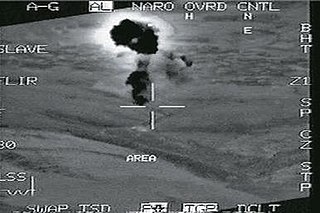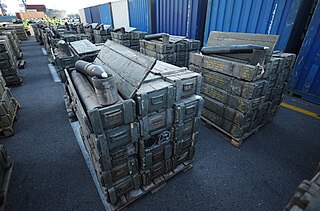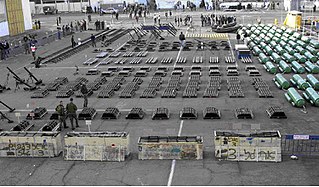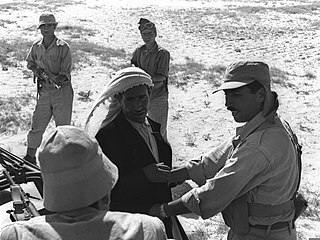 W
WIn 2004 the Israel Defense Forces (IDF) launched Operation Rainbow in the southern Gaza Strip from 12–24 May 2004, involving an invasion and siege of Rafah. The operation was started after the deaths of eleven Israeli soldiers in two Palestinian attacks, in which M113 armored vehicles were attacked.
 W
WIn 2008 the Israel Defense Forces launched Operation Hot Winter, also called Operation Warm Winter, in the Gaza Strip, starting on February 29, 2008 in response to Qassam rockets fired from the Strip by Hamas onto Israeli civilians. At least 112 Palestinian militants and civilians, along with three Israelis, were killed, and more than 150 Palestinians and seven Israelis were injured.
 W
WIn November 2012, the Israel Defense Forces launched Operation Pillar of Defense which was an eight-day campaign in the Hamas-governed Gaza Strip, which began on 14 November 2012 with the killing of Ahmed Jabari, chief of the Gaza military wing of Hamas by an Israeli airstrike.
 W
WThe Ain es Saheb airstrike occurred on 5 October 2003 and was the first overt Israeli military operation in Syria since the 1973 Yom Kippur War.
 W
WOperation Entebbe or Operation Thunderbolt was a successful counter-terrorist hostage-rescue mission carried out by commandos of the Israel Defense Forces (IDF) at Entebbe Airport in Uganda on 4 July 1976.
 W
WThe Francop Affair was a high seas incident on November 4, 2009 in which the Israeli Navy seized the cargo ship MV Francop in the eastern Mediterranean Sea and its cargo of hundreds of tons of weapons allegedly bound from Iran to Hezbollah. The incident is also known by its military operation name, Operation Four Species.
 W
WOperation Full Disclosure was a military operation carried out by the Israel Defense Forces on March 5, 2014, in the Red Sea. After days of surveillance far out to sea, Israeli Navy Shayetet 13 commandos seized the Iranian-owned and Panamanian-registered merchant vessel Klos C that had set sail from Iran, heading for Port Sudan via Iraq. On board, the commandos found long-range missiles suspected to be destined for Gaza concealed in containers full of Iranian bags marked as Portland cement. An unnamed senior Egyptian security official reportedly confirmed that the arms shipment was headed for militants in either Gaza or Sinai. A UN panel of experts concluded that the weapons came from Iran and were being sent to Sudan, accusing Iran of violating the arms embargo. United Nations Security Council Resolution 1929 authorizes states to seize items, including arms, that Iran is forbidden from exporting.
 W
WThe Gaza War, also known as Operation Cast Lead, also known in the Muslim world as the Gaza Massacre, and referred to as the Battle of al-Furqan by Hamas, was a three-week armed conflict between Gaza Strip Palestinian paramilitary groups and the Israel Defense Forces (IDF) that began on 27 December 2008 and ended on 18 January 2009 with a unilateral ceasefire. The conflict resulted in between 1,166 and 1,417 Palestinian and 13 Israeli deaths.
 W
WThe Israel−Gaza security barrier is a border barrier first constructed by Israel in 1994 between the Gaza Strip and Israel. The barrier runs along the entire land border of the Gaza Strip. Entry into the Gaza Strip by land is through five crossing points: the northern Erez Crossing into Israel, the southern Rafah Crossing into Egypt, the eastern Karni Crossing used only for cargo, and the other cargo crossing points, the Kerem Shalom Crossing on the border with Egypt and the Sufa Crossing farther north.
 W
WThe Israeli West Bank barrier or wall or fence is a separation barrier in the West Bank or along the Green Line. Israel calls it a security barrier against terrorism, while Palestinians call it a racial segregation or apartheid wall. At a total length of 708 kilometres (440 mi) upon completion, the route traced by the barrier is more than double the length of the Green Line, with 15% of the barrier's length running along the Green Line or inside Israel, while the remaining 85% is inside the West Bank going up to 18 kilometres (11 mi) from the West Bank border, isolating about 9% of the land and 25,000 Palestinians from the rest of West Bank.
 W
WThe Karine A affair, also known as Operation "Noah's Ark", was an Israeli military action in January 2002 in which Israeli forces seized MV Karine A, which, according to IDF, was a Palestinian freighter in the Red Sea. The vessel was found to be carrying 50 tons of weapons, including short-range Katyusha rockets, antitank missiles, and high explosives.
 W
WOperation Returning Echo was an Israel Defense Forces (IDF) military operation in the Gaza Strip from March 9 until March 14, 2012. It was the worst outbreak of violence covered by the media in the region since the 2008–2009 Gaza War.
 W
WThe 2006 Israel–Gaza conflict, known in Israel as Operation "Summer Rains" was a series of battles between Palestinian militants and the Israel Defense Forces (IDF) during summer 2006, prompted by the capture of Israeli soldier Gilad Shalit by Palestinian militants on 25 June 2006. Large-scale conventional warfare occurred in the Gaza Strip, starting on 28 June 2006, which was the first major ground operation in the Gaza Strip since Israel's unilateral disengagement plan was implemented between August and September 2005.
 W
WThe Prevention of Infiltration Law is an Israeli law enacted in 1954, which deals with unauthorised entry of people into Israel, which it terms infiltration. The law defines offenses of armed and non-armed unauthorised entry to Israel. The law authorises the Minister of Defense to order the deportation of an infiltrator before or after conviction.
 W
WSabena Flight 571 was a scheduled passenger flight from Brussels to Lod via Vienna operated by the Belgian national airline, Sabena. On 8 May 1972 a Boeing 707 passenger aircraft operating that service, captained by British pilot Reginald Levy, DFC, was hijacked by four members of the Black September Organization, a Palestinian terrorist group. Following their instructions, Captain Levy landed the plane at Lod Airport.